News & Media
Build the connection going forward
The role of convocants towards education beyond the 21st century is not to underestimated, according to Prof Ahmed Bawa, CEO of Universities South Africa (USAf). “It is dictated to us that as we look to have solutions in the far future, we must remember to solve the problems we have now.”
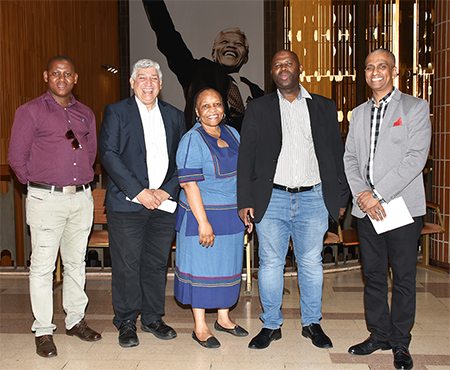
Sabelo Mhlungu (President: Unisa Convocation, Prof Ahmed Bawa (CEO: USAf), Khanya Mahlare (ED: DIA) Dr Somadoda Fikeni (Director: VC Projects and Advisor to the Principal), and Dr Faroon Goolam (Registrar)
This he said at the Convocation Lecture held on 10 December 2018 at Unisa’s Muckleneuk Campus. Bawa paid homage to Unisa, the alma mater that offered him an opportunity to receive education, and moreover insight into the world of theoretical physics—an opportunity to advance in his first love. He emphasised that “this was when no other university could not due to a myriad of reasons, at the top of which was affordability”
Although, at the time, Unisa studies were paper-based and heavily relied on post, learning was seamless. “Tutorial handbooks were decent and correlated well with studies”. The only thing that made his study journey laborious was the absence of one-on-one interaction that he said “would be crucial for the young student who deeply desires that kind of communication”.
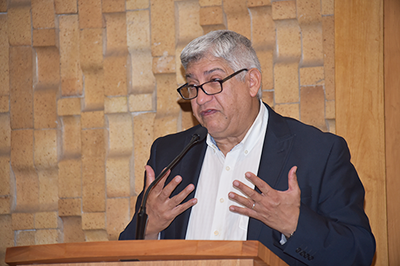
Prof Ahmed Bawa (CEO: USAf), keynote speaker of the event
Putting a stop to deteriorating universities
Looking to the near future though, Bawa warned of universities currently pricing themselves out of reach of the poor, which will hinder their role in building social mobility to result in equal and just societies. “Universities are social knowledge institutions that should be in a position to be able to address societal issues such as political violence, growing inequalities, poverty, the growing anti-intellectualism, erosion of human rights and ethics, and compounding health issues such as HIV, diabetes and Ebola, which all have socio-economic roots.”
The provision of education is faced with rapid changes in particular those occurring in the world of work. “It is a reality, locally and globally, and no university,” he said, “can say they are not interested in these issues because institutions of higher learning form bridges with communities. They are the producers and disseminators of new knowledge which will work to enhance the quality of graduates we have.”
Bawa said that it was important that convocants became active in putting a stop to deteriorating universities and that “the convocants’ passion should be re-ignited to see universities connect with the public even more and to in effect also become defenders of universities”.
He cited that universities had lost their defenders and publics during the transition of South Africa in 1994 and that new ones needed to be created. “Convocants are the right publics to build the connection going forward and consider the local connection too.”
Mitigate underclass and overclass
As people turn to Unisa for education, “it was important for it to seize opportunities there too”. He urged Unisa to remember to enhance its efficiency in the area of access and success in order to give the student a fair chance of success. This is also with regard to the changes that are brought by the digital era, which he believes are an opportune time for the institution to make changes.
According to Bawa, the massive nexus of humans and technology across all the industries especially with regard to the introduction of robotics, citing the auto industry, will bring massive changes to impact on South Africa’s labour market, which will likely add to societal inequalities. “The big challenge would be in trying to mitigate underclass and overclass. In this case, Unisa has the opportunity to create a platform for life-long learning, which can be seen as learning, unlearning and learning again.”
Interacting with each other and the world
Some of the salient issues to consider, he said, are in flexible learning. “In the long run students should be able to pass their courses even if it take longer to do so. This is in looking at the fact that the value of degrees will not be as vital in the near future. People are looking for courses that are relevant to their world of work and their lives.”
Flexibility is also apparent even in newer issues currently at play globally, Bawa said. “There is the need for consultancy work (the gig economy) where people sell their trade versus being fully employed. A typical example is in the newer trend of office pods where people can hire offices for even a day.”
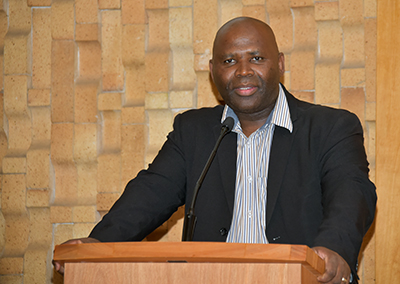
Dr Somadoda Fikeni (Director: VC Projects and Advisor to the Principal), facilitator of the lecture
People are also becoming dependent on social media, which can allow for constant learning despite the hugely negative challenges it brings with it. This begs the question, will there be virtual universities?” he asked.
“The world is about data, its acquisition and analytics. Genetic studies in the role of populations and diseases will help answer difficult questions. We have not been able to do away with climate change and resilience studies will be on how to survive despite climate change.”
As Bawa concluded his address, he said that none of these goals can be achieved in silos. “The biggest challenge is in finding ways of interacting with each other and the world. While we engage in character building through education, we also have to engage in building new humanisms,” he said.
Who is Ahmed Bawa?
Ahmed Bawa, a theoretical physicist, leads Universities South Africa. Until 30 April 2016, he was Vice-Chancellor and Principal of Durban University of Technology and before that spent several years as a faculty member of the Department of Physics and Astronomy at Hunter College and a member of the doctoral faculty at the Graduate Centre, City University of New York. He served as the Programme Officer for Higher Education in Africa with the Ford Foundation and during this time led and coordinated the Foundation’s African Higher Education Initiative.
Ahmed Bawa holds a PhD in Theoretical Physics from the University of Durham in the UK. He served on a number of policy development teams in the post-1994 period in the areas of Science and Technology and Higher Education. He is a Fellow of the Royal Society of South Africa as well as the Academy of Science of South Africa, of which he was one of the inaugural vice-presidents and is a current Council member. He also served as Chair of the Board of the Foundation for Research Development, and was Vice-Chair of the board of the Atomic Energy Corporation.
*By Busisiwe Mahlangu
Publish date: 2018-12-18 00:00:00.0

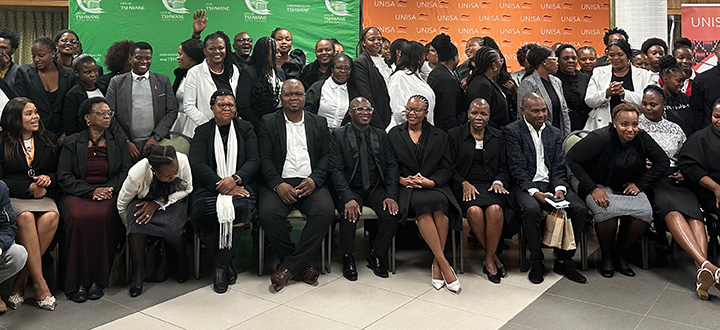 Unisa academics join hands to celebrate World Social Work Day
Unisa academics join hands to celebrate World Social Work Day
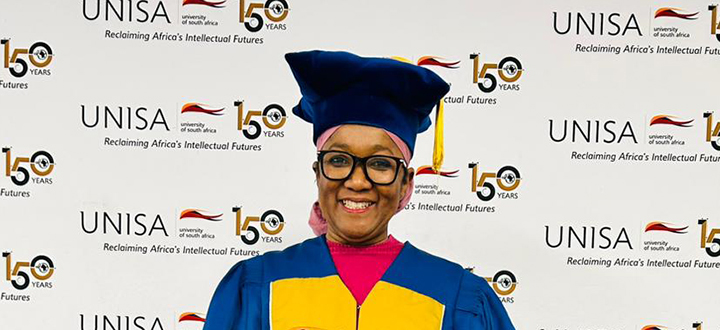 Unisa community engagement initiative targets school underperformance
Unisa community engagement initiative targets school underperformance
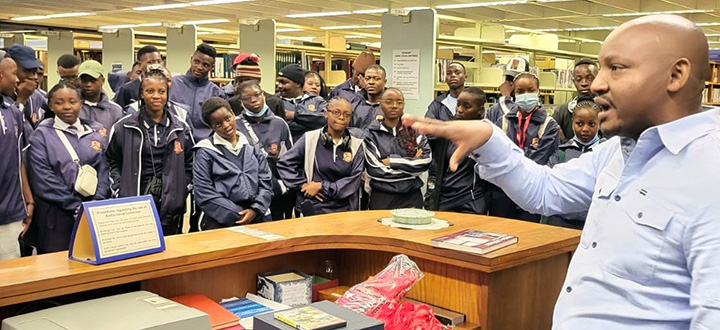 Library tour introduces learners to the wonderful world of Unisa
Library tour introduces learners to the wonderful world of Unisa
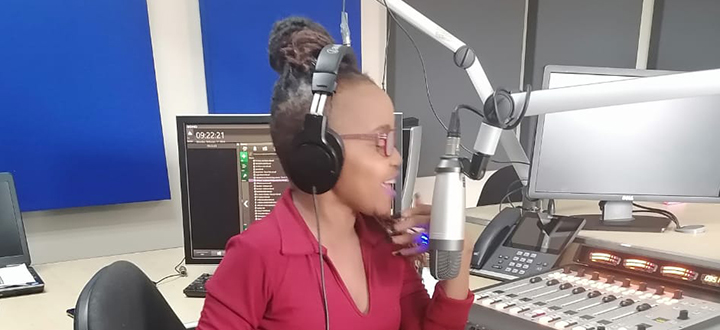 Unisa Radio volunteer wins prestigious community journalism award
Unisa Radio volunteer wins prestigious community journalism award
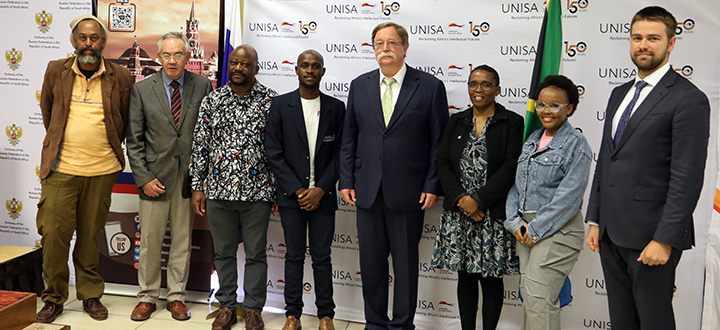 Unisa's student leadership engage with Russian ambassador
Unisa's student leadership engage with Russian ambassador